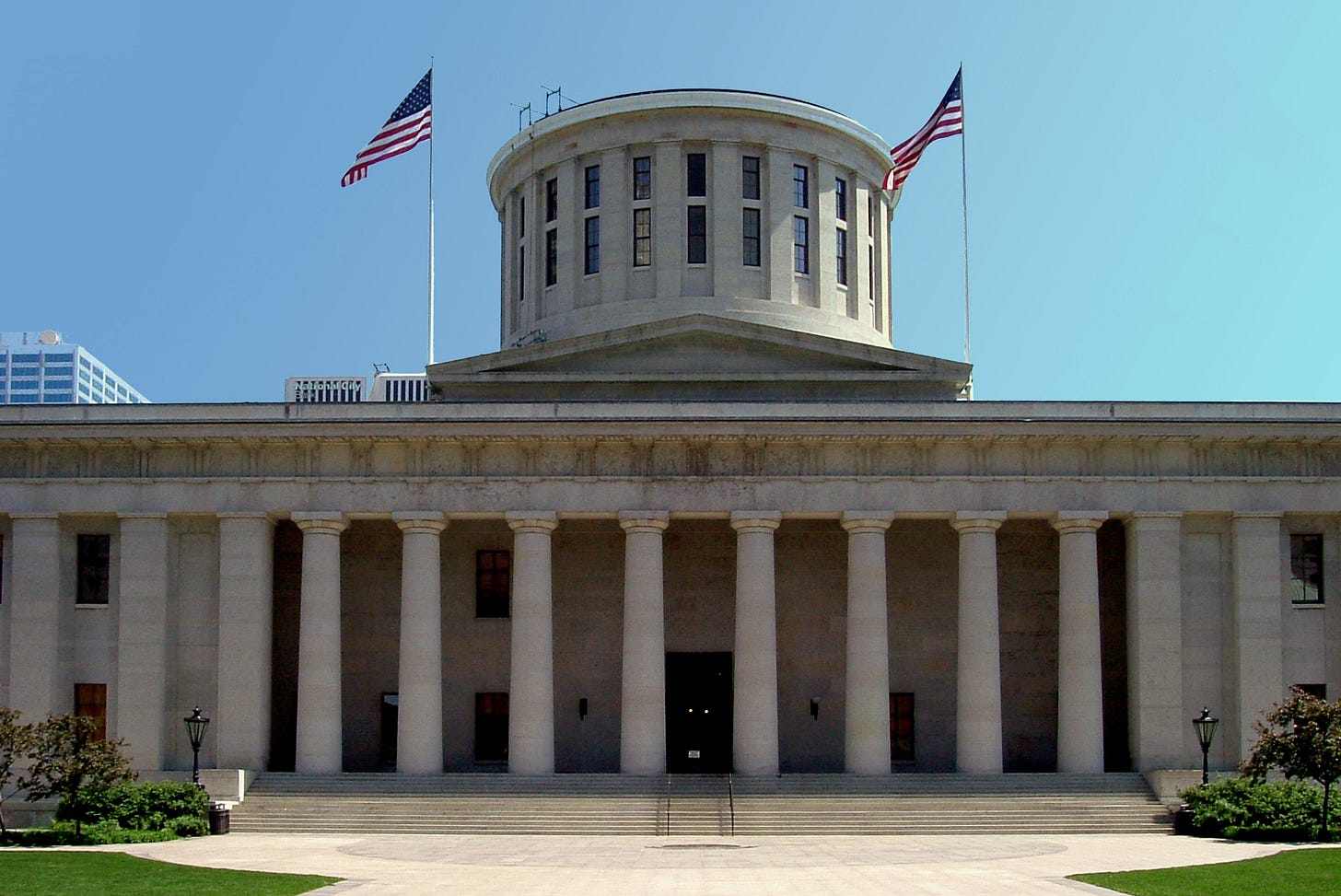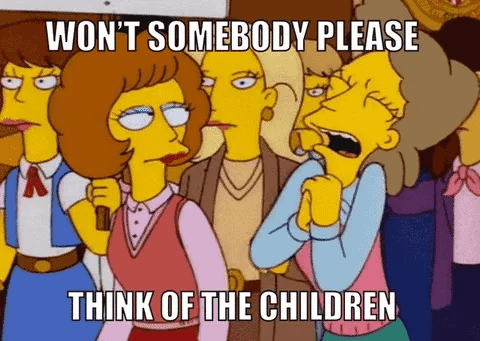Ohio’s “Indecent Exposure Act” poses new threats to body freedom
Rebranded drag ban expands obscenity law in ways that could target public nudity and gender nonconformity
A newly reintroduced bill in Ohio is reviving old concerns about the future of body freedom in public spaces. Branded the Indecent Exposure Modernization Act, House Bill 249 purports to protect children from “over-sexualized performances” in parks and other public venues. But its vague language and sweeping definitions raise red flags for nudists, naturists, and others whose presence in public defies conventional dress norms.
Introduced by Republican state Representatives Angie King and Josh Williams, the bill seeks to prohibit so-called “adult cabaret performances” outside designated adult entertainment venues. This category includes performers who use makeup, clothing, or prosthetics to express a gender identity different from that assigned at birth—clearly aiming to criminalize drag. But it also includes topless dancers, go-go dancers, strippers, and “exotic dancers”—a broad classification that has historically been used to justify anti-nudity crackdowns.
While the bill does not explicitly ban nudity, it expands the definition of public indecency and obscenity to include performances that “incorporate themes, imagery, and acts intended for mature audiences”.1 That language could be easily applied to a nude body in a nonsexual setting, especially in the absence of clear legal protection for naturism. Moreover, the bill codifies a broad prohibition on exposing “private parts [...] under circumstances in which the person’s conduct is likely to be viewed by and affront others”2—a subjective standard that invites selective enforcement.
Risks for naturists
Naturists in Ohio already face legal ambiguity. Nonsexual social nudity is not affirmatively protected by state law and is often left to the discretion of local authorities. With legislation like H.B. 249, that discretion could now come with harsher consequences, including misdemeanor or felony charges depending on the circumstances. If a person is nude or partially nude in a setting where a child is present—and a bystander interprets it as “indecent”—they could face serious criminal penalties under the new bill’s provisions. Penalties escalate rapidly: a fourth-degree misdemeanor for a first offense, up to a fifth-degree felony if the nudity is repeated or allegedly witnessed by a minor.3
This puts even peaceful expressions of body freedom at risk. A skinny dip in a remote river, a topless sunbather at a public beach, or an art model at an outdoor festival could all become vulnerable to prosecution—not because they are doing anything sexually explicit, but because someone deems their body an “affront.” The bill does not distinguish between sexually motivated exposure and mere nudity unless the exposure is explicitly for “personal sexual arousal or gratification” and directed at a minor.4 For naturists, this is part of a troubling trend: the rebranding of censorship as child protection.

“We are seeing trends of indecent exposure and over-sexualized performances taking place in public in the presence of children,” Representative Williams said in a statement. “This legislation is simply updating already existing law to the times that we are living in”.5 But what exactly counts as “over-sexualized” or “indecent” is never clearly defined.
Naturist and nudist organizations and advocates focused on government affairs are aware of the bill and are actively monitoring its progress. While no specific action has been taken yet, the potential consequences for body freedom draw concern that warrants organized preparation to oppose this bill if and when it comes up for a public hearing.
Culture war legislation
LGBTQ+ advocates in Ohio have already condemned the bill as a thinly veiled attack on queer culture and public expression, noting that a similar version of the legislation failed to advance last year after heavy protest.
That previous bill, House Bill 245, introduced in 2023 by the same sponsors, sought to ban “adult cabaret performances” in public spaces where minors could be present. It defined such performances to include entertainers who exhibit a gender identity different from their assigned sex at birth using clothing, makeup, or prosthetics. The bill faced significant opposition from LGBTQ+ advocates and civil rights organizations, who argued that it infringed upon free speech and targeted marginalized communities. Ultimately, H.B. 245 failed to advance out of committee, highlighting the contentious nature of such legislation.
In promoting the newly reintroduced version of the bill, Representative Angie King emphasized her commitment to safeguarding children. “I am deeply committed to protecting our children,” she said in a statement. “As a mother and as a legislator, I believe Ohio families should feel safe taking their children to a city park without the risk of coming across an event or person performing in a way that incorporates themes, imagery, and acts intended for mature audiences”.6
This kind of appeal reflects what’s often called Lovejoy’s Law, a phrase drawn from the character Helen Lovejoy on The Simpsons, who famously pleaded, “Won’t somebody please think of the children!” It’s become shorthand for an increasingly familiar political move: exploiting concern for children’s safety to justify laws that lack strong evidence and often end up targeting marginalized groups.
While the bill’s language—and its sponsors’ rhetoric—focus mainly on drag performers, the implications reach further. It echoes a broader cultural crackdown on visible bodies that challenge social norms—whether that means being nude, trans, disabled, or simply different.
This bill highlights the urgent need for solidarity between naturists and LGBTQ+ communities—groups that, while distinct, often face overlapping forms of scrutiny. Both have been falsely conflated with obscenity, perversion, or harm to minors, despite decades of evidence to the contrary. Naturism has long insisted that the naked body is not inherently sexual, just as LGBTQ+ advocates have fought to disentangle gender expression from indecency. But laws like H.B. 249 blur those distinctions, allowing moral judgments to drive enforcement. As lawmakers continue to exploit public discomfort with nonconforming bodies, the risk grows that peaceful expressions of nudity or gender nonconformity will be swept up in the same wave of criminalization. Now more than ever, it is essential to build alliances across movements that defend bodily autonomy, free expression, and the right to be seen.
The bill has not yet been assigned to a committee, but its reappearance should serve as a warning: when lawmakers decide that some bodies don’t belong in public, all of us should be concerned. 🪐
Ohio House of Representatives. (2025, May). King, Williams introduce Indecent Exposure Act: Legislation will update Ohio obscenity laws. https://www.ohiohouse.gov/members/angela-n-king/news/king-williams-introduce-indecent-exposure-act-131225
H.B. 249, 136th Gen. Assemb., Reg. Sess. (Ohio 2025), §2907.09(A)(1), https://www.legislature.ohio.gov/legislation/136/hb249.
(H.B. 249, 2025, §2907.09(C)(2)).
(H.B. 249, 2025, §2907.09(B)(4)).
Henry, M. (2025, May 12). Ohio Republican lawmakers re-introduce drag ban bill. Ohio Capital Journal. https://ohiocapitaljournal.com/briefs/ohio-republican-lawmakers-re-introduce-drag-ban-bill/
(Ohio House of Representatives, 2025).





Republican-leaning nudists in Ohio, this is your time to shine. Step up to the plate and talk to your lawmakers.
When I see "Think of the children" I wonder if the speaker has looked at all at the research.
West, K. (2023). Think of the children!: Relationships between nudity‐related experiences in childhood, body image, self‐esteem and adjustment. Children & Society, 37(4), pp.1187-1202.
West's research documents that when children are exposed to healthy nudity that they have a greater body image and self-esteem. Over the past century there have numerous studies looking for potential impacts and none have shown any lasting harm from parents being nude with their children.
As Mark Twain said "No amount of evidence will ever persuade an idiot."